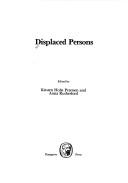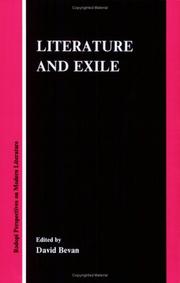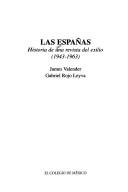Book
ISBN: 9782364420908 Year: 2019 Publisher: Lyon : Equipe de recherche MARGE : Maison des Langues : Université Jean Moulin Lyon 3,
Abstract | Keywords | Export | Availability | Bookmark
 Loading...
Loading...Choose an application
- Reference Manager
- EndNote
- RefWorks (Direct export to RefWorks)
Exiles' writings, Russian --- Collective memory --- Littérature d'exil russe. --- Soviet Union --- URSS --- History --- Literature and the revolution. --- Emigration and immigration
Book
ISBN: 238185116X 9782381851167 2841335046 Year: 2015 Publisher: Caen : Presses universitaires de Caen ,
Abstract | Keywords | Export | Availability | Bookmark
 Loading...
Loading...Choose an application
- Reference Manager
- EndNote
- RefWorks (Direct export to RefWorks)
création littéraire --- littérature d’exil --- lieux imaginaires --- cadre du récit --- Literature: history & criticism --- Literary theory --- Gresser, Anne-Marie --- France
Book
ISBN: 0333525221 Year: 1992 Publisher: New York, NY : MacMillan,
Abstract | Keywords | Export | Availability | Bookmark
 Loading...
Loading...Choose an application
- Reference Manager
- EndNote
- RefWorks (Direct export to RefWorks)
ECRIVAINS EXILES --- LITTERATURE D'EXIL --- LITTERATURE ANGLAISE A L'ETRANGER --- LITTERATURE AMERICAINE A L'ETRANGER --- BIOGRAPHIES --- HISTOIRE ET CRITIQUE

ISBN: 187104930X Year: 1988 Publisher: Sydney Mundelstrup Coventry : Dangaroo Press,
Abstract | Keywords | Export | Availability | Bookmark
 Loading...
Loading...Choose an application
- Reference Manager
- EndNote
- RefWorks (Direct export to RefWorks)
'Displaced persons' explores the problems faced by refugees and migrants in the rich society of the Western world today as they are seen by the refugees and migrants themselves. Consequently the main focus is on the literature written by these displaced persons. In articles and interviews the writers discuss the issues of language, cultural transmission and racism, and in short stories and poems they give artistic expression to their thoughts and feelings. The one exception to this is the article tracing the legal concept of refugees which is written by Sweden's ombudsman for refugees, Peter Nobel. The purpose of the volume is to offer an insight into the lives and problems of displaced persons and incidentally to show the high quality of the writing which is coming out of those communities today.
Émigration et immigration --- Littérature anglaise --- Littérature australienne --- Littérature d'exil anglaise --- Immigrés --- Auteurs appartenant à des minorités --- Grande-Bretagne --- Australie
Book
ISBN: 9783487144122 Year: 2010 Publisher: Hildesheim Zürich New York : G. Olms,
Abstract | Keywords | Export | Availability | Bookmark
 Loading...
Loading...Choose an application
- Reference Manager
- EndNote
- RefWorks (Direct export to RefWorks)
Warum greifen Schriftsteller trotz schwierigster äußerer Bedingungen immer wieder zur Feder? Was motiviert den Künstler, selbst unter persönlicher Bedrohung und mit geringer Aussicht auf Veröffentlichung, trotzdem zu schreiben? Sind es gerade jene prekären und zuweilen lebensbedrohlichen Umstände, die den schöpferischen Menschen zur künstlerischen Arbeit zwingen, um das, was ihn innerlich bedrängt, in Form zu fassen? Dieser Sammelband vereinigt mehr als zwanzig Aufsätze des in den USA lehrenden Germanisten Dieter Sevin, die sich mit der deutschsprachigen Literatur des 20. Jahrhunderts beschäftigen. Im Zentrum stehen dabei vor allem Schriftsteller im Exil und in der DDR sowie literarische Werke, die in Umbruch- und Krisenzeiten geschrieben wurden. Neben namhaften Autoren wie Theodor Plievier, Hilde Domin, Christa Wolf und Christoph Hein geraten dabei auch unbekanntere Autoren und Texte in den Fokus des Interesses, die es wert sind, wiederentdeckt zu werden. Eine abschließende Beschäftigung mit literarischen Werken des 19. Jahrhunderts öffnet den Blick für Kontinuitäten und Diskontinuitäten dieses Themas.
Littérature allemande --- Littérature d'exil --- Exil --- Allemagne (République démocratique) --- 20e siècle --- Dans la littérature --- Histoire et critique --- Thèmes, motifs --- Critique et interprétation

ISBN: 9051832214 Year: 1990 Volume: vol 4 Publisher: Amsterdam Rodopi
Abstract | Keywords | Export | Availability | Bookmark
 Loading...
Loading...Choose an application
- Reference Manager
- EndNote
- RefWorks (Direct export to RefWorks)
Comparative literature --- Thematology --- anno 1900-1999 --- Authors [Exiled ] --- Ecrivains exilés --- Schrijvers in ballingschap --- Exiles' writings --- History and criticism --- Literature [Modern ] --- 20th century --- LITTERATURE D'EXIL --- EXILES DANS LA LITTERATURE --- HISTOIRE ET CRITIQUE

ISBN: 3150080894 9783150080894 Year: 1985 Volume: 8089 Publisher: Stuttgart Reclam
Abstract | Keywords | Export | Availability | Bookmark
 Loading...
Loading...Choose an application
- Reference Manager
- EndNote
- RefWorks (Direct export to RefWorks)
German poetry --- 830-14 --- Duitse literatuur: lyriek; minnezang; religieuze poëzie; lied --- 830-14 Duitse literatuur: lyriek; minnezang; religieuze poëzie; lied --- German literature --- 830 <100> --- 830 <100> Exilliteratur --- Exilliteratur --- POESIE ALLEMANDE --- LITTERATURE D'EXIL ALLEMANDE --- 20E SIECLE --- ANTHOLOGIES

ISBN: 9681208811 607564024X Year: 1999 Publisher: México, D.F. Colegio de México
Abstract | Keywords | Export | Availability | Bookmark
 Loading...
Loading...Choose an application
- Reference Manager
- EndNote
- RefWorks (Direct export to RefWorks)
Dada la necesidad de lograr un reconocimiento internacional al gobierno de la República Española, un grupo de intelectuales españoles exiliados en México crean diferentes revistas literarias y de lucha política. Entre las diferentes revistas que se editaron, Las Españas fue la más longeva (1946-1963). Sus objetivos fueron dos principalmente: ofrecer un espacio donde se contrarrestara la represión cometida por el franquismo con la colaboración tanto de escritores exiliados como los radicados en España; y sobre todo, la de buscar la unidad nacional respetando las diferentes posturas regionalistas y partidistas imprimiéndole así su carácter heterodoxo. Este libro nos presenta un estudio detallado de la polémica historia de Las Españas.
Spanish literature --- History of civilization --- anno 1940-1949 --- anno 1960-1969 --- anno 1950-1959 --- Mexico --- Litterature d'exil. --- Espagnols --- Exiles --- Litterature espagnole --- Periodiques. --- Persons --- Aliens --- Deportees --- Refugees --- Españas (Mexico City, Mexico) --- History of the Americas
Book
ISBN: 9782875740328 2875740326 Year: 2013 Publisher: Bruxelles Lang
Abstract | Keywords | Export | Availability | Bookmark
 Loading...
Loading...Choose an application
- Reference Manager
- EndNote
- RefWorks (Direct export to RefWorks)
Quelle est la différence entre un écrivain considéré sans distinction aucune, un écrivain québécois, un écrivain forgé par l’immigration et un écrivain étiqueté comme écrivain migrant ? Y a-t-il un lien entre le contexte socioculturel et historique du Québec et l’émergence des « écritures migrantes » ? Quand un écrivain migre, ses sources d’inspirations migrent-elles avec lui ? Peut-on parler d’un seul imaginaire migrant ou bien, à l’instar de leurs auteurs, les sujets migrent-ils à leur tour ? À quel niveau, la dimension migrante se laisse-t-elle le mieux observer ?Cet ouvrage se propose de cerner ces différentes questions pour rendre hommage aux écritures migrantes, courant littéraire éphémère et redondant de la fin du XXe siècle au Québec. L’auteure cherche à expliquer la popularité de ce phénomène complexe qui dépasse de loin le domaine de la langue et littérature francophone et se retrouve, un peu à son insu, à la croisée de plusieurs disciplines telles que la sociologie, la psychologie (voire la psychanalyse), l’histoire, les politiques de l’immigration et, surtout, face à la problématique du regard qui fige et définit.Structuré autour de trois grandes questions (le statut des écrivains issus de l’immigration, les thèmes et la langue), cet ouvrage joint à un contexte spécifique – celui de l’effervescence culturelle et sociopolitique au Québec à la fin du XXe siècle – la réflexion sur la représentation littéraire de l’immigration et de l’identité, interpellée dans toute sa postmodernité.
Exiles' writings --- Canada --- Québec (Province) --- French-Canadian literature --- Foreign authors --- 840 <71> --- 840 <71> Franse literatuur--Canada --- Franse literatuur--Canada --- Émigration et immigration --- Littérature d'exil --- Littérature canadienne de langue française
Book
ISBN: 1283857588 3110258684 3112204166 9783110258684 9783110258677 3110258676 9783112204160 3110258676 9781283857581 311033206X Year: 2012 Publisher: Berlin New York : De Gruyter,
Abstract | Keywords | Export | Availability | Bookmark
 Loading...
Loading...Choose an application
- Reference Manager
- EndNote
- RefWorks (Direct export to RefWorks)
After 1933, New York City gave shelter to many leading German and German-Jewish intellectuals. Stripped of their German citizenship by the Nazi-regime, these public figures either stayed in the New York area or moved on to California and other places. This compendium, adopting the title of a famous volume published by Klaus and Erika Mann in 1939, explores the impact the US, and NYC in particular, had on these authors as well as the influence they in turn exerted on US intellectual life. Moreover, it addresses the transformations that took place in the exiled intellectuals’ thinking when it was translated into another language and addressed to an American audience. Among the individuals presented in this volume, are such prominent names as T.W. Adorno, H. Arendt, W. Benjamin, E. Bloch, B. Brecht, S. Kracauer, the Mann family, S. Morgenstern, and E. Panofsky.
Exiles' writings, German --- Germans --- Ethnology --- History and criticism. --- New York (N.Y.) --- Intellectual life --- German Exile Literature. --- New York / Literary History. --- Allemands --- Exil --- Littérature d'exil allemande --- Vie intellectuelle --- Dans la littérature --- A l'étranger

 Search
Search Feedback
Feedback About UniCat
About UniCat  Help
Help News
News